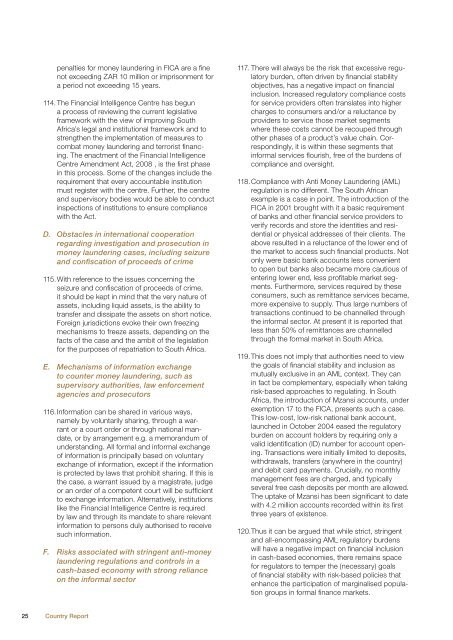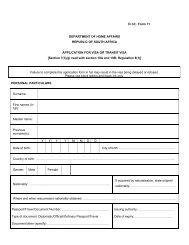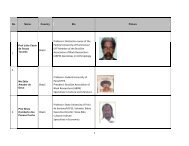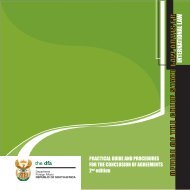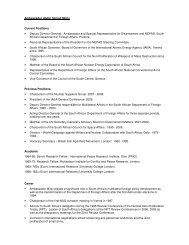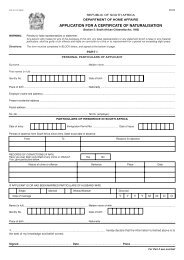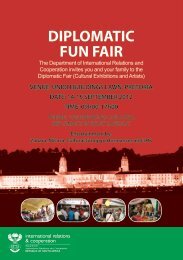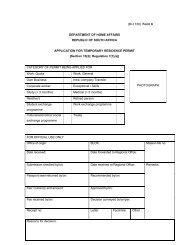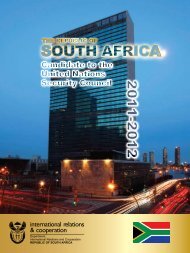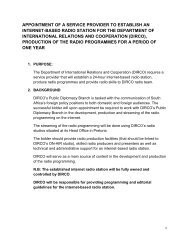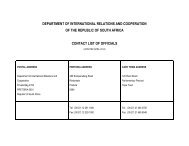Read more - Department of International Relations and Cooperation
Read more - Department of International Relations and Cooperation
Read more - Department of International Relations and Cooperation
You also want an ePaper? Increase the reach of your titles
YUMPU automatically turns print PDFs into web optimized ePapers that Google loves.
penalties for money laundering in FICA are a fine<br />
not exceeding ZAR 10 million or imprisonment for<br />
a period not exceeding 15 years.<br />
114. The Financial Intelligence Centre has begun<br />
a process <strong>of</strong> reviewing the current legislative<br />
framework with the view <strong>of</strong> improving South<br />
Africa’s legal <strong>and</strong> institutional framework <strong>and</strong> to<br />
strengthen the implementation <strong>of</strong> measures to<br />
combat money laundering <strong>and</strong> terrorist financing.<br />
The enactment <strong>of</strong> the Financial Intelligence<br />
Centre Amendment Act, 2008 , is the first phase<br />
in this process. Some <strong>of</strong> the changes include the<br />
requirement that every accountable institution<br />
must register with the centre. Further, the centre<br />
<strong>and</strong> supervisory bodies would be able to conduct<br />
inspections <strong>of</strong> institutions to ensure compliance<br />
with the Act.<br />
D. Obstacles in international cooperation<br />
regarding investigation <strong>and</strong> prosecution in<br />
money laundering cases, including seizure<br />
<strong>and</strong> confiscation <strong>of</strong> proceeds <strong>of</strong> crime<br />
115. With reference to the issues concerning the<br />
seizure <strong>and</strong> confiscation <strong>of</strong> proceeds <strong>of</strong> crime,<br />
it should be kept in mind that the very nature <strong>of</strong><br />
assets, including liquid assets, is the ability to<br />
transfer <strong>and</strong> dissipate the assets on short notice.<br />
Foreign jurisdictions evoke their own freezing<br />
mechanisms to freeze assets, depending on the<br />
facts <strong>of</strong> the case <strong>and</strong> the ambit <strong>of</strong> the legislation<br />
for the purposes <strong>of</strong> repatriation to South Africa.<br />
E. Mechanisms <strong>of</strong> information exchange<br />
to counter money laundering, such as<br />
supervisory authorities, law enforcement<br />
agencies <strong>and</strong> prosecutors<br />
116. Information can be shared in various ways,<br />
namely by voluntarily sharing, through a warrant<br />
or a court order or through national m<strong>and</strong>ate,<br />
or by arrangement e.g. a memor<strong>and</strong>um <strong>of</strong><br />
underst<strong>and</strong>ing. All formal <strong>and</strong> informal exchange<br />
<strong>of</strong> information is principally based on voluntary<br />
exchange <strong>of</strong> information, except if the information<br />
is protected by laws that prohibit sharing. If this is<br />
the case, a warrant issued by a magistrate, judge<br />
or an order <strong>of</strong> a competent court will be sufficient<br />
to exchange information. Alternatively, institutions<br />
like the Financial Intelligence Centre is required<br />
by law <strong>and</strong> through its m<strong>and</strong>ate to share relevant<br />
information to persons duly authorised to receive<br />
such information.<br />
F. Risks associated with stringent anti-money<br />
laundering regulations <strong>and</strong> controls in a<br />
cash-based economy with strong reliance<br />
on the informal sector<br />
117. There will always be the risk that excessive regulatory<br />
burden, <strong>of</strong>ten driven by financial stability<br />
objectives, has a negative impact on financial<br />
inclusion. Increased regulatory compliance costs<br />
for service providers <strong>of</strong>ten translates into higher<br />
charges to consumers <strong>and</strong>/or a reluctance by<br />
providers to service those market segments<br />
where these costs cannot be recouped through<br />
other phases <strong>of</strong> a product’s value chain. Correspondingly,<br />
it is within these segments that<br />
informal services flourish, free <strong>of</strong> the burdens <strong>of</strong><br />
compliance <strong>and</strong> oversight.<br />
118. Compliance with Anti Money Laundering (AML)<br />
regulation is no different. The South African<br />
example is a case in point. The introduction <strong>of</strong> the<br />
FICA in 2001 brought with it a basic requirement<br />
<strong>of</strong> banks <strong>and</strong> other financial service providers to<br />
verify records <strong>and</strong> store the identities <strong>and</strong> residential<br />
or physical addresses <strong>of</strong> their clients. The<br />
above resulted in a reluctance <strong>of</strong> the lower end <strong>of</strong><br />
the market to access such financial products. Not<br />
only were basic bank accounts less convenient<br />
to open but banks also became <strong>more</strong> cautious <strong>of</strong><br />
entering lower end, less pr<strong>of</strong>itable market segments.<br />
Further<strong>more</strong>, services required by these<br />
consumers, such as remittance services became,<br />
<strong>more</strong> expensive to supply. Thus large numbers <strong>of</strong><br />
transactions continued to be channelled through<br />
the informal sector. At present it is reported that<br />
less than 50% <strong>of</strong> remittances are channelled<br />
through the formal market in South Africa.<br />
119. This does not imply that authorities need to view<br />
the goals <strong>of</strong> financial stability <strong>and</strong> inclusion as<br />
mutually exclusive in an AML context. They can<br />
in fact be complementary, especially when taking<br />
risk-based approaches to regulating. In South<br />
Africa, the introduction <strong>of</strong> Mzansi accounts, under<br />
exemption 17 to the FICA, presents such a case.<br />
This low-cost, low-risk national bank account,<br />
launched in October 2004 eased the regulatory<br />
burden on account holders by requiring only a<br />
valid identification (ID) number for account opening.<br />
Transactions were initially limited to deposits,<br />
withdrawals, transfers (anywhere in the country)<br />
<strong>and</strong> debit card payments. Crucially, no monthly<br />
management fees are charged, <strong>and</strong> typically<br />
several free cash deposits per month are allowed.<br />
The uptake <strong>of</strong> Mzansi has been significant to date<br />
with 4.2 million accounts recorded within its first<br />
three years <strong>of</strong> existence.<br />
120. Thus it can be argued that while strict, stringent<br />
<strong>and</strong> all-encompassing AML regulatory burdens<br />
will have a negative impact on financial inclusion<br />
in cash-based economies, there remains space<br />
for regulators to temper the (necessary) goals<br />
<strong>of</strong> financial stability with risk-based policies that<br />
enhance the participation <strong>of</strong> marginalised population<br />
groups in formal finance markets.<br />
25 Country Report


